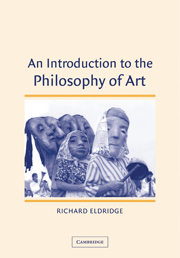Book contents
- Frontmatter
- Contents
- Acknowledgments
- 1 The situation and tasks of the philosophy of art
- 2 Representation, imitation, and resemblance
- 3 Beauty and form
- 4 Expression
- 5 Originality and imagination
- 6 Understanding art
- 7 Identifying and evaluating art
- 8 Art and emotion
- 9 Art and morality
- 10 Art and society: some contemporary practices of art
- 11 Epilogue: the evidence of things not seen
- Bibliography
- Index
4 - Expression
Published online by Cambridge University Press: 05 June 2012
- Frontmatter
- Contents
- Acknowledgments
- 1 The situation and tasks of the philosophy of art
- 2 Representation, imitation, and resemblance
- 3 Beauty and form
- 4 Expression
- 5 Originality and imagination
- 6 Understanding art
- 7 Identifying and evaluating art
- 8 Art and emotion
- 9 Art and morality
- 10 Art and society: some contemporary practices of art
- 11 Epilogue: the evidence of things not seen
- Bibliography
- Index
Summary
Feelings about subject matters in life: Wordsworth, Tolstoy, and Collingwood
Against the idea that works of art present a subject matter and the idea that works of art embody pleasing formal arrangements, it can seem important to emphasize that works of art are products of human action – made things, not just either imitations or forms. Without this emphasis artworks can seem either too much like gratuitous reproductions of reality (like mirrors or reflections in ponds) or too much like objects of idle pleasure and amusement (like pretty decorations). When we instead focus on works of art as things that human beings make, then these misemphases can be corrected. Though they do present a subject matter and please through arrangement, works of art are also made in order somehow to communicate something – an attitude, a point of view, or a feeling about a subject matter – that lies in some sense “in” the maker. Audiences typically approach a work with an interest in what it says, that is, with an interest in which attitudes and emotions toward its subject matter on the part of its maker it makes manifest. It is natural therefore to think that artworks are expressive objects and that it is distinctive of artistic representations and formal arrangements – in contrast with scientific treatises and decorations – that they have as a central function the expression of attitudes and emotions toward their subject matter.
- Type
- Chapter
- Information
- An Introduction to the Philosophy of Art , pp. 68 - 101Publisher: Cambridge University PressPrint publication year: 2003



